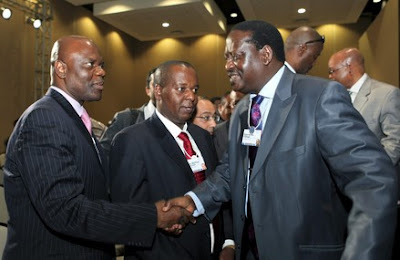By Jerry Okungu
Nairobi, Kenya
October 21, 2010
There was a time in this country when the business community, NGOs, the civil society and the government could never see eye to eye. In fact there was a time when the NGO sector coined a new language for public and private sector operators. They called them state actors and no-state actors that to describe this relationship between the two. State actors were people in government while non state actors were a combination of the business community, the civil society and non-governmental organizations.
In the years prior to the Grand Coalition, no government could do anything right in the eyes of the civil society and the business community. The government was permanently on a sinning mode. If there was corruption, nepotism, ethnicity, misuse of the tax payers’ money, poor labour relations, hunger in the land, rains failed to come or taxation went up; it was all the government’s fault. Whenever banks hiked their lending rates, oil cartels raised pump prices and transport operators raised fares unfairly; it was the fault of the government.
At no time could the gullible public imagine that an NGO, a Civil Society Organization or even a private business enterprise could just be as corrupt, fraudulent or practice tribalism and nepotism with abundance and get away with murder.
If you have worked with a State corporation, a private company and an NGO like I have done at one point in my life, you can begin to appreciate the hypocrisy with which we can sometimes condemn what we call “government excesses” while at the same time turn a blind eye to our own transgressions.
This bad blood between state actors and non-state actors could perhaps be the main reason we have failed to develop as a country. Any society where the main actors are preoccupied with undercutting one another and pulling in different directions is bound to suffer under-development for a long time.
In developed countries, the roles and functions of various state and non-actors are well defined. The state is there to provide a level playing ground and a conducive environment for businesses and humanitarian services to thrive. It is merely a service provider in core areas such as infrastructure development and maintenance of law and order. The private sector on the other hand is to cultivate and develop the production of goods and services as the NGO world provides for humanitarian and watchdog services so that neither the state actor nor the non state actor engages in acts of exploitation or repression of the larger population.
As the collector of taxes, the government is the biggest business partner to the private sector. If it decides to build infrastructure such as housing, roads, power lines, railways, ports and communications links, it turns to the private sector and investors for such supplies. Therefore in an ideal situation, the private and public sectors are like Siamese twins that are joined together at the hip. One cannot survive without the other.
Since the Grand Coalition government came into being, perhaps its single most important achievement has been the innovative idea of having the Prime Minister hold a quarterly meeting Round Table meeting with members of the Business Community. In these meetings, industry leaders discuss openly the challenges that they face in conducting business as they grapple with reform programmes brought about by the new government.
I have not in the past attended such Round Table meetings. This week I was glad I attended and saw the kind of cordial relations that have come about due to this open discussion. Of course we all know that the Grand Coalition is hardly three years old. But if one were to ask for one tangible achievement this initiative has achieved; it is that it has brought about harmony between government and the corporate sector like never before.
As I listened to progress reports delivered by Dr. Edward Sambili of the Ministry of Planning, Mr. David Nalo of the Ministry of East African Community and Hon Najib Balala, Minister for Tourism, I saw a level of openness between the two sides that is definitely a new phenomenon in the relationship between the government and the private sector.
Patrick Obath who spoke on behalf of KEPSA was at ease congratulating the Coalition for bringing about the new constitution and hoped that the new law would bring the much needed wind of change on the land of Kenya. What was equally apparent was that the progress reports given by ministry officials including the Prime Minister’s personal response were so detailed that very few corporate chiefs around had anything to add.
But perhaps in future, let the venue be truly a round table format with progress reports sent to participants in advance such that when the Prime Minister and his team arrive, it is really a round table discussion.
Finally, if 19 permanent Secretaries and 9 cabinet ministers can spare 6 hours to engage the private sector on matters of national interest without resorting to blame game; it means we have come a long way. Can this innovative idea be replicated for the NGO and Civil Society organizations? Yes, they too need the Prime Minister’s attention if this country has to move forward.




0 comments:
Post a Comment